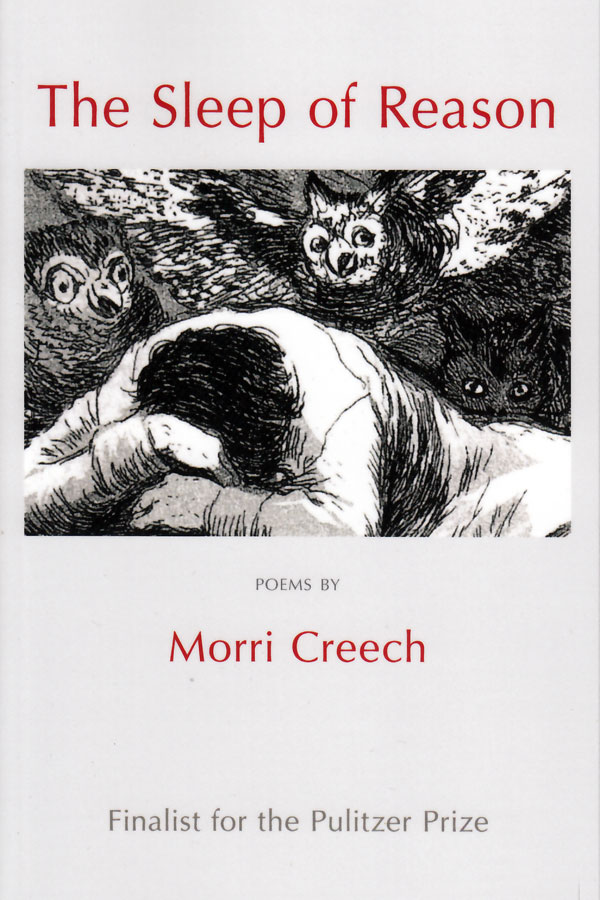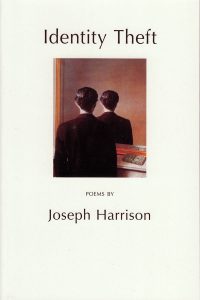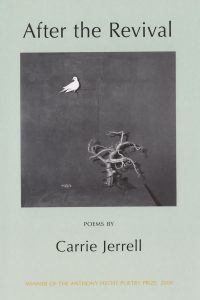The Sleep of Reason
£8.99
Finalist for the Pulitzer Prize for Poetry, 2014
Morri Creech's third collection of poems, The Sleep of Reason, is a lyrical examination of liminal states of consciousness and experience – the shadowy terrain between sleep and waking, dream and nightmare, life and death, history and the present moment. Including both a surprising take on Keats's "Ode to a Nightingale" and a dark meditation on the perils of the sublime, The Sleep of Reason explores the anxieties, horrors, and dreams that flash just beneath the surface of the waking mind, combining formal elegance and an acknowledgment of literary tradition with a fresh, contemporary voice.
Out of stock
The Sleep of Reason
“It’s a rare thing in this day and age to encounter a poet unafraid to think out loud and, moreover, one who possesses the lyric gifts and intellectual savvy to translate those thoughts into the material realities of everyday life. Formal and mimetic, elegiac and acerbic, equally at home with a painting from the Dutch Golden Age and the circus sprawl of popular culture, The Sleep of Reason is as accomplished and intrepid a book of poems as one is likely to find.” – Sherod Santos
"Situations in these poems are "ordinary," a man, say, at the start of a day, looking in a mirror, looking out a window, carrying out the trash, having a job, having a family, having a self, and wondering how it is doing, wondering what his future and his past and this day are; and writing about these things in beautiful expressive lines of verse, faithful measured lines with their varied subtle pressures and subtle cadences, responsive to the variety of pressures and cadences of the thoughts and feelings of the life being lived." – David Ferry
Poetry readers who have encountered Creech’s Field Knowledge and Paper Cathedrals will be intrigued by this third book. W
Reviews of The Sleep of Reason
Fjords Review, October 2014
"The Sleep of Reason is like a fantastic milkshake: Greedy readers who try to consume it quickly will end up with a headache, but those who pace themselves are in for a treat. The book, Creech’s third, is lent flavor and density by his exquisite craftsmanship. Although the thirty-one poems included here take a wide range of forms – ranging from three lines to eight pages; from sonnets to prose poems – all of them are musical, robust, and balanced, even as they treat complex ideas. It is the sophisticated and sometimes somber ways in which these ideas are handled that will lead to brain freeze in overeager readers. Creech’s poems do not function as mere entertainment; they are learned and intricate, both in form and in content, addressing subjects such as time, faith, and nature. Creech’s poetry is meant to linger: to keep audiences up late thinking about the care that went into their construction and their philosophical implications." – Noel Sloboda
To read the whole of this review, please click on the link below:
http://www.fjordsreview.com/reviews/sleep-reason-book.html
Columbia University News, 14 April 2014
ANNOUNCEMENT of the 98th ANNUAL PULITZER PRIZES in JOURNALISM, LETTERS, DRAMA and MUSIC
"[The Sleep of Reason is] a book of masterly poems that capture the inner experience of a man in mid-life who is troubled by mortality and the passage of time, traditional themes that are made to feel new."
The Hudson Review, Autumn 2013
"The title of Morri Creech’s third volume comes from a terrific Goya etching featured on the book’s cover, which shows a man asleep, fierce owl-like creatures hovering above his head. Goya’s full title tells us that the sleep of reason produces monsters, and Creech brilliantly probes the fears, horrors, and anxieties that lurk just below the surface of our waking everyday minds. In an early poem ‘The Dream of Reason,’ the speaker doubts Descartes’ ‘ergo sum / of consciousness,’ affirming that all is flux: ‘Dust spins its bedlam universe / in my mind for days. I’m tired of certainties.’ There is nonetheless an elegant and reasonable structuring throughout, and Creech’s willingness to live in uncertainty with regard to ultimate questions automatically evokes John Keats’s notion of negative capability …Creech’s poems lyrically meditate on photography, painting, a Nazi cigarette lighter, midlife, banks, a night-blooming cereus, birches, and Hamlet. The implied monsters of the book’s title lead us memorably to ‘Landfill,’ a poem that contemplates the ecological consequences of materialism, fashion mandates, rabid consumerism, and a throwaway society. Another monster is war, and ‘Countryman of Bones’is a moving elegy in which Creech speaks to a friend killed in action far from home. He speaks to him at a river where they used to go swimming as teens and within view of the spire of the Baptist church they attended for fifteen years. In ‘Lullaby,’the speaker describes the greedy, warlike world his sleeping daughter will inherit, a place where ‘The crooks who caused the market crash / resign with pocketfuls of cash.’ These are masterful, rewarding poems. – Peter Makuck
To read the whole of this review, please click on the link below:
http://hudsonreview.com/2013/10/beauty-and-truth-laughter-and-memory/#.UmuunrdwaUm
The Warwick Review, September 2013
"Formal poetry naturally walks in the shadow of earlier writers, and Morri Creech rather relishes the summoning power of traditional verse, happy to allude freely yet for the most part keeping the shades where he wants them. ‘Lullaby: Under the Sun’, for instance, conjures Auden’s ‘A Summer Night’ but also recalls ‘a green shade’, ‘an idiot’s tale’, a world ‘made on such stuff’. ‘Late Reading’ is a rumination on Hamlet; two longer pieces gloss nKeats’s ‘Ode to a Nightingale’, the first of them wittily confronting the poet’s own front yard songster:
Beat it, bird. We’ve heard enough about
the charms of elsewhere. While your poured forth your soul
like a poet hidden in the light of thought,
blithe spirit, we grew tired of the whole
immortal business; each of us has drunk
from the cup of sorrows and of boredom, too.
So I’ve wandered out here onto the front lawn
half-dressed, picked up a chunk
of gravel, and I’m aiming it at you.
A nice tune, but we’d rather you were gone.
The author admits ‘I’ve read too many books’ but in fact the literariness doesn’t inflate the poems and – as that chunk of gravel suggests – they always come back to earth … I was reminded most of Larkin, whose profound influence on American poets from Lowell to Nemerov has yet to be fully acknowledged … [T]his poet of the Carolinas never los[es] touch with ordinary concerns, but mak[es] us think about why artists do what they do." – John Greening
Library Journal
"While he declares in ‘The Dream ofReason,’one of the book’s opening poems, ‘Dust spins its bedlam universe/ in my mind for days. I’m tired of certainties,’ there’s a wondrous sense of logic to the entire enterprise. Yes, Creech tosses out challenges (‘What should we say of them, these lush, moon-scented/ blossoms that memorialize the light?’), turning over hard questions as he registers frustration with the human detritus of banks, businesses, and weapons of war, but he finally comes back to the surety and beauty of the universe (‘Better to dwell on other things – / the moon-slicked river, osprey wings / rowing across the empty air’). What’s especially impressive is Creech’s sense of pacing and musicality, lost in some contemporary poetry; lines like ‘At daybreak light falls / through a thin gap in the curtains / like meaning drawn tight on a shivering thread’ reveal a lovely mastery of craft. VERDICT: A poet to watch and, for poetry devotees, certainly to read.
The Trouble
It seems these days you’ve had enough of order.
For months you harried the blackbirds from the yard
with a pellet gun, clatter of pie tins, an absurd
straw-stuffed overcoat, and gave no quarter,
chucking lit fireworks, once, to chase them off
the laundry poles and apple trees. And now?
The pump gun leans against the table saw
in your garage, the clean shirts billow and luff
in mild suburban peace, although the change
has quite unsettled you. It’s true the lawn
looks clear, the trees untroubled. But at dawn
sometimes you hear the creaking of a hinge,
a swing set or a screen door, and you wake
thinking they might be there. Of course, they’re not.
They loiter at the margins of your thought
like a dream you had once but can’t seem to shake,
and now you wake so often that each time
wind sifts the limbs or flaps the empty sleeves
you want to tear them down, scatter the leaves
you spent all season raking into prim
heaps near the road, then stand out in the cold
beneath clouds of a slowly changing weather
and watch the pale sky darken to a feather,
until the meaning wings down and takes hold.
The Waywiser Press
The Dream of Reason
For several minutes the whole drunken room
whirls in my half sleep, and a daze of motes
flares in spindrift galaxies, staggers and floats
like Descartes’ dream, before the ergo sum
of consciousness calms the mind’s delirium,
taking note of the room’s coordinates –
floor and four walls where light accumulates;
the shade of blinds a slight wind moves at random.
What to make of this lingering trick of sense?
Descartes got up and, shaken from his ease
by a dance of sparks, a stranger, and a verse,
constructed from his thought firm evidence.
And me?
Dust spins its bedlam universe
in my mind for days.
I’m tired of certainties.
The Waywiser Press
Excerpts
The Trouble
It seems these days you’ve had enough of order.
For months you harried the blackbirds from the yard
with a pellet gun, clatter of pie tins, an absurd
straw-stuffed overcoat, and gave no quarter,
chucking lit fireworks, once, to chase them off
the laundry poles and apple trees. And now?
The pump gun leans against the table saw
in your garage, the clean shirts billow and luff
in mild suburban peace, although the change
has quite unsettled you. It’s true the lawn
looks clear, the trees untroubled. But at dawn
sometimes you hear the creaking of a hinge,
a swing set or a screen door, and you wake
thinking they might be there. Of course, they’re not.
They loiter at the margins of your thought
like a dream you had once but can’t seem to shake,
and now you wake so often that each time
wind sifts the limbs or flaps the empty sleeves
you want to tear them down, scatter the leaves
you spent all season raking into prim
heaps near the road, then stand out in the cold
beneath clouds of a slowly changing weather
and watch the pale sky darken to a feather,
until the meaning wings down and takes hold.
The Waywiser Press
The Dream of Reason
For several minutes the whole drunken room
whirls in my half sleep, and a daze of motes
flares in spindrift galaxies, staggers and floats
like Descartes’ dream, before the ergo sum
of consciousness calms the mind’s delirium,
taking note of the room’s coordinates –
floor and four walls where light accumulates;
the shade of blinds a slight wind moves at random.
What to make of this lingering trick of sense?
Descartes got up and, shaken from his ease
by a dance of sparks, a stranger, and a verse,
constructed from his thought firm evidence.
And me?
Dust spins its bedlam universe
in my mind for days.
I’m tired of certainties.
The Waywiser Press





